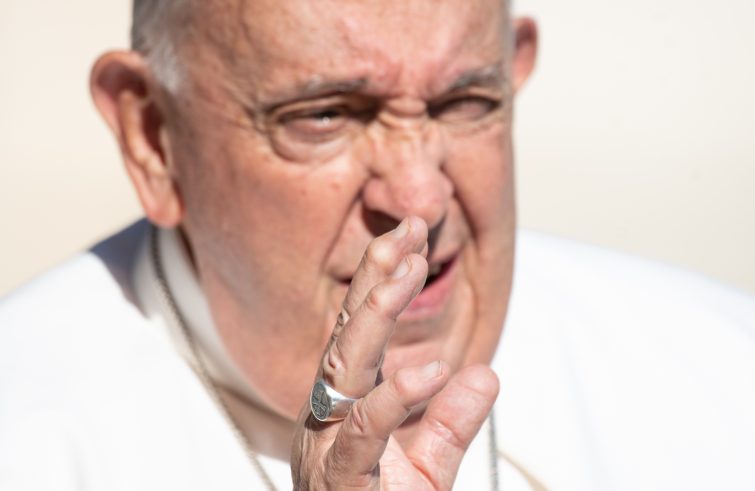
To Hope and Act with Creation means “to join forces and to walk together with all men and women of good will; to help to rethink, “among other things, the question of human power, its meaning and its limits”, this is explained by Pope Francis in his Message for the World Day of Creation, to be celebrated next September 1st with the theme “Hope and Act with Creation.” “Our power has frenetically increased in a few decades”, is the Pope’s analysis: “We have made impressive and awesome technological advances, yet we have not realized that at the same time we have turned into highly dangerous beings, capable of threatening the lives of many beings and our own survival.”
“Unchecked power creates monsters and then turns against us”, is Francis’ cry of alarm: “Today, then, there is an urgent need to set ethical limits on the development of artificial intelligence, since its capacity for calculation and simulation could be used for domination over humanity and nature, instead of being harnessed for the service of peace and integral development.”
“Hope can be seen as the possibility of remaining steadfast amid adversity, of not losing heart in times of tribulation or in the face of human evil. The Pope reminds the faithful:
“Christian hope does not disappoint, nor does it deceive.
The groaning of creation, of Christians and of the Spirit is the anticipation and expectation of a salvation already at work; all the same, we continue to find ourselves enduring what Saint Paul describes as “tribulation, distress, persecution, famine, nakedness, peril, sword.” In this respect, “hope is an alternative reading of history and human affairs. It is not illusory, but realistic, with the realism of a faith that sees what is unseen. This hope is patient expectation, like that of Abraham.” In this regard, Pope Francis mentions “that great visionary believer, Joachim of Fiore, the Calabrian abbot who, in the words of Dante Alighieri, ‘was endowed with a spirit of prophecy’. At a time of violent conflicts between the Papacy and the Empire, the Crusades, the outbreak of heresies and growing worldliness in the Church, Joachim was able to propose the ideal of a new spirit of coexistence among people, based on universal fraternity and Christian peace, the fruit of a life lived in the spirit of the Gospel.” “I spoke of this spirit of social friendship and universal fraternity in Fratelli Tutti,” Francis remarked, “but this harmony among men and women should also be extended to creation, in a ‘situated anthropocentrism’, and in a sense of responsibility for a humane and integral ecology, the path to salvation for our common home and for us who inhabit it.”
“Why is there so much evil in the world? Why so much injustice, so many fratricidal wars that kill children, destroy cities, pollute the environment and leave mother earth violated and devastated?”,
the Pope asks. Drawing from Saint Paul, Francis thus reminds us that “the moral struggles of Christians are linked to the ‘groaning’ of creation”: “The entire universe and every creature therein groans and yearns ‘impatiently’ for its present condition to be overcome and its original state to be restored. Our liberation thus includes that of all other creatures who, in solidarity with the human condition, were placed under the yoke of slavery.” “Creation itself, like humanity, was enslaved, albeit through no fault of its own, and finds itself unable to fulfil the lasting meaning and purpose for which it was designed. It is subject to dissolution and death, aggravated by the human abuse of nature.” The Holy Spirit, the Pope reminds us,
“calls us to conversion, to a change in lifestyle in order to resist the degradation of our environment
and to engagement in that social critique which is above all a witness to the real possibility of change.”
“This conversion entails leaving behind the arrogance of those who want to exercise dominion over others and nature itself, reducing the latter to an object to be manipulated, and instead embracing the humility of those who care for others and for all of creation.” “When human beings claim to take God’s place, they become their own worst enemies”, the Pope said quoting from Laudate Deum, “for Adam’s sin has tainted our fundamental relationships, namely with God, with ourselves, with one another and with the universe. All these relationships need to be integrally restored, saved and “put right”. None of them can be overlooked, for if even one is lacking, everything else fails.”
“The earth is entrusted to our care, yet continues to belong to God.” For this reason, “to claim the right to possess and dominate nature, manipulating it at will, thus represents a form of idolatry”,
reads the Pope’s Message. “It is a Promethean version of man who, intoxicated by his technocratic power, arrogantly places the earth in a ‘dis-graced’ condition, deprived of God’s grace”, Francis remarks quoting the words of Benedict XVI: “It is not science that redeems man: man is redeemed by love, the love of God in Christ, from which nothing and no one can ever separate us.”










